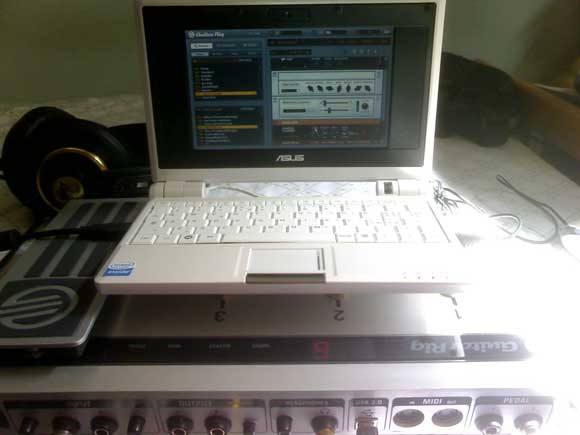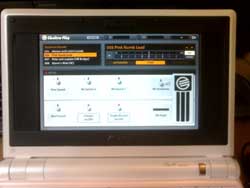
The Asus Eee PC is unlikely to be your first choice of laptops for music. But it’s small, it’s cute, and it’s ridiculously cheap. Some CDM-reading computer enthusiasts are biting, as we found out in March when we asked you if you had turned the Eee PC into a music box.
On the Linux side, you’ve got lots of options. Best among these, CDM reader Dan Stowell has put together a comprehensive tutorial on using SuperCollider, the powerful, free sound synthesis engine. You can even add custom GUIs using a free Java-based tool. There are also plenty of DIY environments for music working nicely (Csound and Pd included, as well), meaning the Eee can very quickly become a programmable, dedicated sound machine and synth for the price of the cheapest closed-box, name-brand piece of music gear.
Linux also supports various music tools that lend themselves to a lower-end machine, like music tracker MilkyTracker. Check it out in videos on the Eee: Eee-PC MilkyTracker Xandros, more. (Thanks, emrox!)
 The surprise is, full-blown Windows software holds its own. From the NI forums, a group of intrepid Guitar Rig 3 users have fired up XP and have a pretty usable, self-contained Guitar Rig computer:
The surprise is, full-blown Windows software holds its own. From the NI forums, a group of intrepid Guitar Rig 3 users have fired up XP and have a pretty usable, self-contained Guitar Rig computer:
Guitar Rig on Eee PC [Native Instruments forums; thanks to Jahmal Tonge for the tip!]
The trick is, you do need modded video drivers to make use of 1000×600 resolution, thus accommodating the user interface. Forum members also suggest avoiding the newer Atom model as they believe it will be slower. Then again, while this proof of concept is tantalizing, I’d probably hold out for more-powerful mini PCs coming out — and the fact that music works this well on this machine means it only gets better from here.
Computer Music Magazine did do a review of the Eee, and were a little more practical about the Eee’s downsides (though the resolution hack here helps at least with that problem). But then, the other way of looking at this is that the Eee is just the beginning. Plenty more budget mini-laptops are coming; already machines from HP and others close the gap with “conventional”, pricier laptops. Linux distributions may soon target these configurations (Ubuntu has promised a “remix”), and Microsoft has committed to keeping XP and Vista going on these machines, as well. And that means the price divide with computer music is getting erased fast.